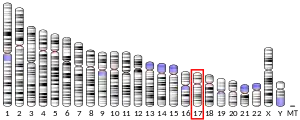60S ribosomal protein L23a
60S ribosomal protein L23a is a protein that in humans is encoded by the RPL23A gene.[3][4]
| RPL23A | |||||||||||||||||||||||||||||||||||||||||||||||||||
|---|---|---|---|---|---|---|---|---|---|---|---|---|---|---|---|---|---|---|---|---|---|---|---|---|---|---|---|---|---|---|---|---|---|---|---|---|---|---|---|---|---|---|---|---|---|---|---|---|---|---|---|
| |||||||||||||||||||||||||||||||||||||||||||||||||||
| Identifiers | |||||||||||||||||||||||||||||||||||||||||||||||||||
| Aliases | RPL23A, L23A, MDA20, ribosomal protein L23a | ||||||||||||||||||||||||||||||||||||||||||||||||||
| External IDs | OMIM: 602326 HomoloGene: 133569 GeneCards: RPL23A | ||||||||||||||||||||||||||||||||||||||||||||||||||
| |||||||||||||||||||||||||||||||||||||||||||||||||||
| |||||||||||||||||||||||||||||||||||||||||||||||||||
| |||||||||||||||||||||||||||||||||||||||||||||||||||
| |||||||||||||||||||||||||||||||||||||||||||||||||||
| Wikidata | |||||||||||||||||||||||||||||||||||||||||||||||||||
| |||||||||||||||||||||||||||||||||||||||||||||||||||
Function
Ribosomes, the organelles that catalyze protein synthesis, consist of a small 40S subunit and a large 60S subunit. Together these subunits are composed of 4 RNA species and approximately 80 structurally distinct proteins. This gene encodes a ribosomal protein that is a component of the 60S subunit. The protein belongs to the L23P family of ribosomal proteins. It is located in the cytoplasm. The protein may be one of the target molecules involved in mediating growth inhibition by interferon. In yeast, the corresponding protein binds to a specific site on the 26S rRNA. This gene is co-transcribed with the U42A, U42B, U101A, and U101B small nucleolar RNA genes, which are located in its third, first, second, and fourth introns, respectively. As is typical for genes encoding ribosomal proteins, there are multiple processed pseudogenes of this gene dispersed through the genome.[4]
Clinical significance
L23a has been identified as an autoimmune target that causes a form of rheumatoid arthritis in mice and which also causes a reaction from T cells and autoantibodies from human rheumatoid arthritis patients.[5]
References
- GRCh38: Ensembl release 89: ENSG00000198242 - Ensembl, May 2017
- "Human PubMed Reference:". National Center for Biotechnology Information, U.S. National Library of Medicine.
- Fan W, Christensen M, Eichler E, Zhang X, Lennon G (Feb 1998). "Cloning, sequencing, gene organization, and localization of the human ribosomal protein RPL23A gene". Genomics. 46 (2): 234–9. doi:10.1006/geno.1997.5038. PMID 9417910.
- "Entrez Gene: RPL23A ribosomal protein L23a".
- Ito Y, Hashimoto M, Hirota K, Ohkura N, Morikawa H, Nishikawa H, Tanaka A, Furu M, Ito H, Fujii T, Nomura T, Yamazaki S, Morita A, Vignali DA, Kappler JW, Matsuda S, Mimori T, Sakaguchi N, Sakaguchi S (2014). "Detection of T cell responses to a ubiquitous cellular protein in autoimmune disease". Science. 346 (6207): 363–8. Bibcode:2014Sci...346..363I. doi:10.1126/science.1259077. PMC 5554397. PMID 25324392.
Further reading
- Wool IG, Chan YL, Glück A (1996). "Structure and evolution of mammalian ribosomal proteins". Biochem. Cell Biol. 73 (11–12): 933–47. doi:10.1139/o95-101. PMID 8722009.
- Fan W, Cai W, Parimoo S, Schwarz DC, Lennon GG, Weissman SM (1996). "Identification of seven new human MHC class I region genes around the HLA-F locus". Immunogenetics. 44 (2): 97–103. doi:10.1007/BF02660056. PMID 8662070. S2CID 21628804.
- Jiang H, Lin JJ, Tao J, Fisher PB (1997). "Suppression of human ribosomal protein L23A expression during cell growth inhibition by interferon-beta". Oncogene. 14 (4): 473–80. doi:10.1038/sj.onc.1200858. PMID 9053844.
- Jäkel S, Görlich D (1998). "Importin beta, transportin, RanBP5 and RanBP7 mediate nuclear import of ribosomal proteins in mammalian cells". EMBO J. 17 (15): 4491–502. doi:10.1093/emboj/17.15.4491. PMC 1170780. PMID 9687515.
- Rogan S, Heaphy S (2001). "The vaccinia virus E3L protein interacts with SUMO-1 and ribosomal protein L23a in a yeast two hybrid assay". Virus Genes. 21 (3): 193–5. doi:10.1023/A:1008139514123. PMID 11129635. S2CID 8941317.
- Uechi T, Tanaka T, Kenmochi N (2001). "A complete map of the human ribosomal protein genes: assignment of 80 genes to the cytogenetic map and implications for human disorders". Genomics. 72 (3): 223–30. doi:10.1006/geno.2000.6470. PMID 11401437.
- Andersen JS, Lyon CE, Fox AH, Leung AK, Lam YW, Steen H, Mann M, Lamond AI (2002). "Directed proteomic analysis of the human nucleolus". Curr. Biol. 12 (1): 1–11. doi:10.1016/S0960-9822(01)00650-9. PMID 11790298. S2CID 14132033.
- Suzuki Y, Yamashita R, Shirota M, Sakakibara Y, Chiba J, Mizushima-Sugano J, Nakai K, Sugano S (2004). "Sequence comparison of human and mouse genes reveals a homologous block structure in the promoter regions". Genome Res. 14 (9): 1711–8. doi:10.1101/gr.2435604. PMC 515316. PMID 15342556.
- Olsen JV, Blagoev B, Gnad F, Macek B, Kumar C, Mortensen P, Mann M (2006). "Global, in vivo, and site-specific phosphorylation dynamics in signaling networks". Cell. 127 (3): 635–48. doi:10.1016/j.cell.2006.09.026. PMID 17081983. S2CID 7827573.
- Ewing RM, Chu P, Elisma F, Li H, Taylor P, Climie S, McBroom-Cerajewski L, Robinson MD, O'Connor L, Li M, Taylor R, Dharsee M, Ho Y, Heilbut A, Moore L, Zhang S, Ornatsky O, Bukhman YV, Ethier M, Sheng Y, Vasilescu J, Abu-Farha M, Lambert JP, Duewel HS, Stewart II, Kuehl B, Hogue K, Colwill K, Gladwish K, Muskat B, Kinach R, Adams SL, Moran MF, Morin GB, Topaloglou T, Figeys D (2007). "Large-scale mapping of human protein-protein interactions by mass spectrometry". Mol. Syst. Biol. 3 (1): 89. doi:10.1038/msb4100134. PMC 1847948. PMID 17353931.
External links
- PDBe-KB provides an overview of all the structure information available in the PDB for Human 60S ribosomal protein L23a

